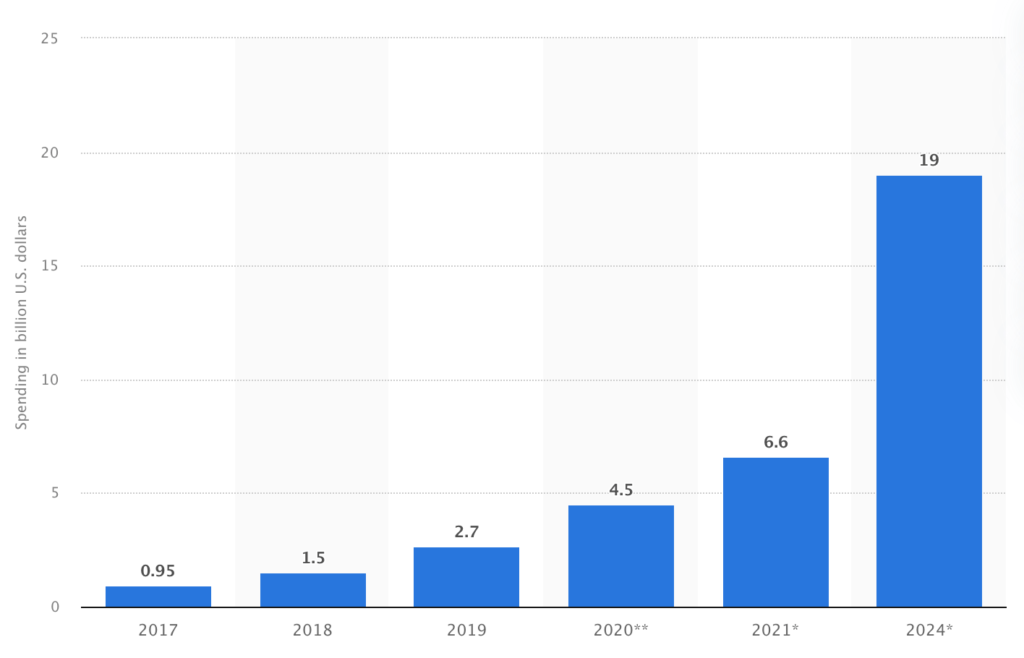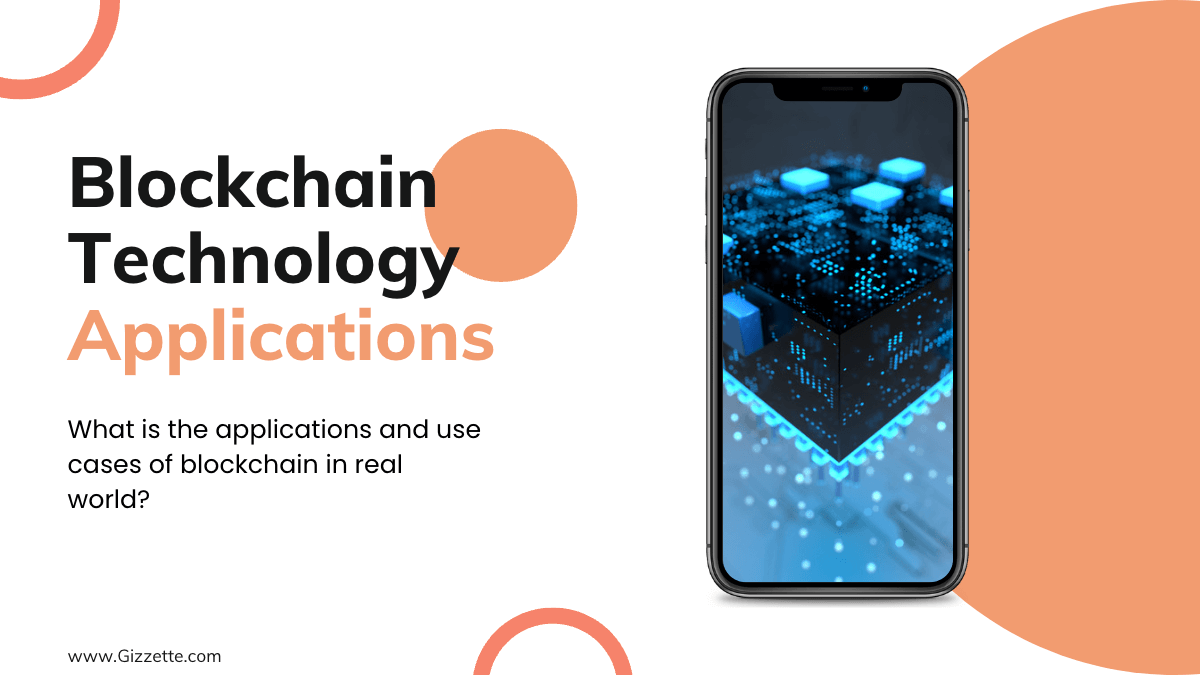The applications of blockchain technology stretch far beyond digital currencies like bitcoin. This technology is affecting many different industries in ways that range from how contracts are implemented to making the government run more effectively. It can increase openness and justice while also saving organizations time and money.
Blockchain is mostly used to verify data, limit access to certain data, and protect people’s identities. All of these uses are made possible by the unique properties of the technology. Businesses all over the world are starting to use private blockchains for things like keeping records and doing business within the company. They are also starting to use public blockchains like Bitcoin in their payment systems.
Therefore, the benefits that the blockchain will bring to our world cannot be overlooked.
Worldwide spending on blockchain technology
The threats of blockchain remain, even though the technology has not been maintained to the latest standards. The world, however, is investing cash in it because new technologies take time to develop but ultimately reward those who invest in them early with fruitful returns.

The global expenditure on blockchain solutions was $6.6 billion in 2021. Spending on blockchain solutions is expected to keep going up over the next few years and reach more than 19 billion U.S. dollars by 2024.
Statista
Top applications of blockchain technology in real-life
1-Money Transfers
Blockchain technology’s original use still has a lot of potentials. Blockchain-based money transfers have the potential to be both cheaper and faster than the standard money transfer services now available.
This is especially true for the sluggish and costly process of international transactions. Transferring funds between bank accounts can take days even in the current U.S. banking system, while blockchain transactions only take minutes.

Followings are the companies that use blockchain to transfer money
- Chainalysis
- Circle
- Algorand
- Chain.io
2-Financial Transactions
Over the past few years, a number of new organizations have sprung up to help with decentralized bitcoin trades. Blockchain-based trading paves the way for instant and cheap dealings. Investors have more autonomy and security over their funds with a decentralized exchange because they are not required to deposit them with the central authority.
Blockchain-based exchanges may specialize in digital currencies, but the technology might be used for other types of assets as well.
3-Smart Contracts in Insurance
Smart contracts on a blockchain could help policyholders and insurers understand each other better. If all claims were put on a blockchain, customers would not be able to make more than one claim for the same thing. The use of smart contracts also helps expedite the payment procedure for claimants.
Blockchain-based contracts are becoming incredibly common as sectors such as government, healthcare, and real estate
Following are the companies that are using blockchain-based contracts.

- Dfinity: generate smart contracts and decentralized applications of any size
- BurstIQ assists medical professionals and patients in safely transferring critical data.
- MediaChain: Make use of smart contracts to pay musicians what they are promised.
- Propy Inc. uses blockchain to speed up title issuance and even sells real estate using cryptocurrencies.
4-Ease Lending
Smart contracts can be used by lenders to carry out collateralized loans made possible by blockchain technology. A service payment, margin call, loan payoff, and asset release can all be directly controlled by smart contracts on the blockchain. Because of the time and money saved in loan processing, lenders can offer more competitive interest rates.
5-Protecting Private Data
Some believe that using a public ledger (like a blockchain) to store sensitive information like a person’s Social Security number, date of birth, and other identifying details is safer than using the present, more vulnerable approach. Tourism, health care, banking, and even academia can all benefit from using blockchain technology to keep personal information more secure and make it easier to access.
6-Casting a Ballot
If the personal identification information is stored on the distributed ledger, the next step would be to use blockchain technology to vote. By utilizing blockchain technology, we can guarantee that no one casts a vote more than once, that only eligible voters cast ballots, and that ballots are not altered in any way.
Voting may be made as easy as tapping a few buttons on a smartphone, expanding the number of people who can participate. Simultaneously, the price of holding an election would drop significantly.
7-Property / Real Estate
Any time you buy or sell real estate, you have to fill out a lot of paperwork, from proving your financial standing to transferring deeds and titles. Using blockchain technology to keep track of property deals could make verifying and transferring ownership easier and more transparent. That has the potential to speed up deals, cut down on paperwork, and save cash.
8-Government Welfare Programs
Welfare, Social Security, and Medicare are just some of the government programs that could benefit from using digital identities stored on a blockchain to streamline the application process. Using blockchain technology could cut down on both fraud and the costs of doing business. Likewise, digital disbursement on the blockchain allows for faster receipt of funds by recipients.
9-Safely exchange health records
By putting patient information in a distributed ledger, doctors can get the most up-to-date and accurate information about their patients. With it in place, patients who see many providers may rest assured that they are receiving the highest quality treatment.
In this way, the process of retrieving medical records can be sped up, which can lead to faster care in specific situations. And if insurance information is stored there, doctors can quickly check if a patient is covered for their therapy.
10-Royalties to artists
Blockchain technology can be used to keep tabs on digital music and movie files as they circulate online, allowing creators to be paid for their work. Because blockchain technology was developed to eliminate duplicate copies of data, it can be used to combat file-sharing networks.
More importantly, increasing transparency and guarantees that artists get paid by using a blockchain to track playbacks on streaming platforms and a smart contract to disburse royalties
11-Non-fungible tokens (NFTs)
People often think of non-fungible tokens (NFTs) as a way to protect intellectual property rights in digital works of art. Since the blockchain stops duplicate data from showing up, putting an NFT on the ledger makes sure that there is only ever one copy of a piece of digital art. Buying art this way can be similar to buying actual art but without the hassles of keeping it safe and secure.
NFTs can be used in a number of ways, but their main purpose is to transfer ownership of any asset that can be represented by data. Anything from a property deed to the right to broadcast a video or admission to a special event falls under this category. Any conceivably novel item (NFT) is a candidate.
12-Logistics and supply chain monitoring
There are a number of benefits that may be gained by using blockchain technology to keep track of products as they travel through a logistics or supply chain network. For starters, having all transaction information in one central location on a distributed ledger makes it much simpler for businesses to coordinate and share information. Second, the immutability of blockchain data means that it is more secure and less prone to tampering
So, people in the logistics and supply chain will be more sure that the information they are sharing is correct and up-to-date. This will make it easier for them to work together.
13-Network security for the IoT
The Internet of Things (IoT) has the potential to make our lives better, but it also gives bad people new ways to steal personal information or damage important infrastructure. Passwords and other sensitive information can be stored on a distributed network using blockchain technology, making them more secure than ever before.
Because a blockchain is so hard to change, it also keeps unauthorized people from getting to the data it stores.
Following are the companies that are making IoT safer and smarter.

- HYPR: It employs decentralized solutions to assess the security of IoT devices.
- Xage Security: It is blockchain-powered cyber security platform for IoT.
- Helium: It tracks and reports real-time asset data in IoT devices
14-Data Storage
When blockchain technology is added to a data storage solution, it can make it more reliable and stable. In contrast to a centrally located data storage provider, which may only have a few points of redundancy, a decentralized data storage network makes it more difficult to hack into and wipe out all the data on the network.
It also implies that more people can have access to information because it won’t always be dependent on the functions of a single business. Blockchain data storage has the potential to be cheaper in several use cases.
Applications of blockchain technology are still developing
Blockchain technology has only been around for 12 years, but businesses are always looking for new ways to use it to help their operations. There is an increasing need for the data protection, access, visibility, and integrity that blockchain can offer as the amount of digital data used in our lives increases.
Despite the nearly 14 applications we listed above, blockchain technology is only just beginning to see these uses. The implementation of blockchain is currently confronting a number of challenges, and the world is discovering solutions for its better implementation.





Leave a Comment